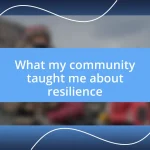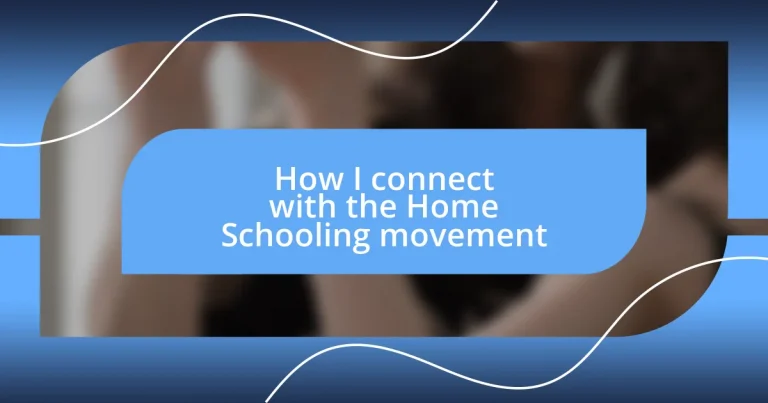Key takeaways:
- Home schooling allows parents to create a customized learning experience that aligns with their values and the child’s interests, fostering a deeper connection between them.
- Engagement with home schooling communities, such as local co-ops and online forums, provides essential support, resources, and networking opportunities for families.
- Regular evaluation and reflection of the home schooling journey help parents adapt strategies to better meet their children’s learning needs and enhance overall educational outcomes.
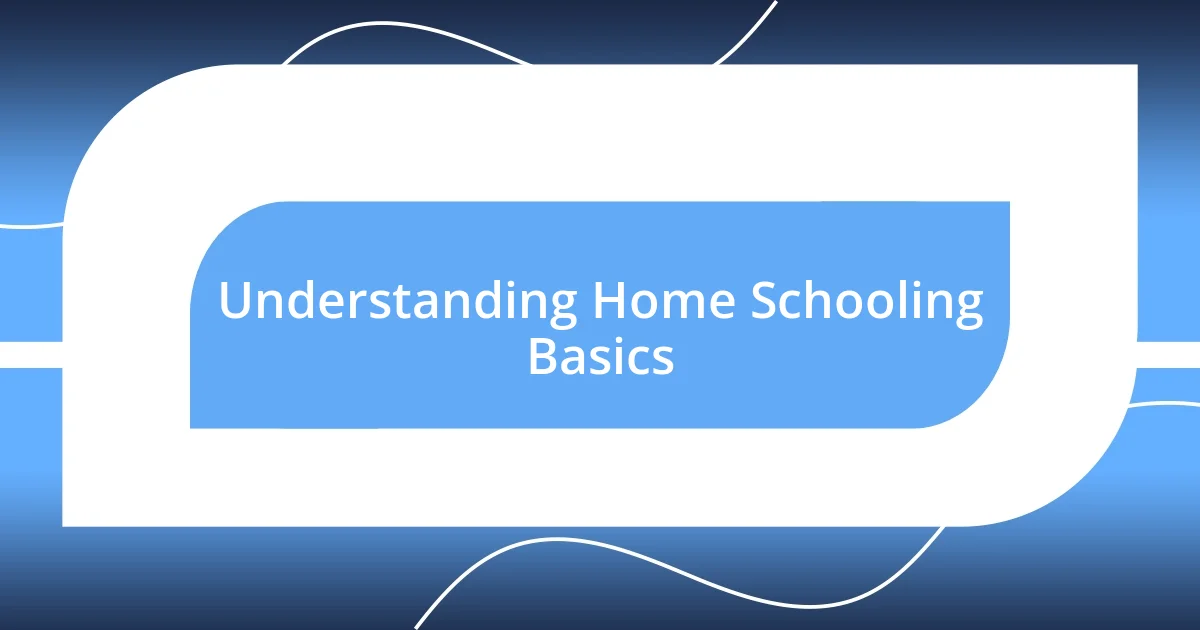
Understanding Home Schooling Basics
Home schooling, at its core, is an educational choice where parents take the responsibility of teaching their children at home instead of sending them to traditional public or private schools. I remember the first time I met a home schooling family; it was fascinating to see how they crafted a curriculum that aligned with their values and beliefs. Have you ever thought about how powerful it is for parents to shape their child’s educational journey directly?
Each home schooling experience is unique, influenced by the family’s educational philosophy, the resources available, and the child’s individual learning style. I often wonder how families decide on which subjects to prioritize. In my encounters, I observed some parents focus heavily on creative subjects like art and music, while others emphasize STEM (science, technology, engineering, and mathematics) education, leading to rich discussions about what truly matters for a child’s growth.
The decision to home school also fosters a deep connection between parents and children, something I’ve seen first-hand. I once spoke with a mom who shared how home schooling allowed her to understand her child’s interests better, creating a nurturing environment for both academic and personal development. Isn’t it remarkable to think that through such a choice, learning can become a shared adventure instead of a structured task?
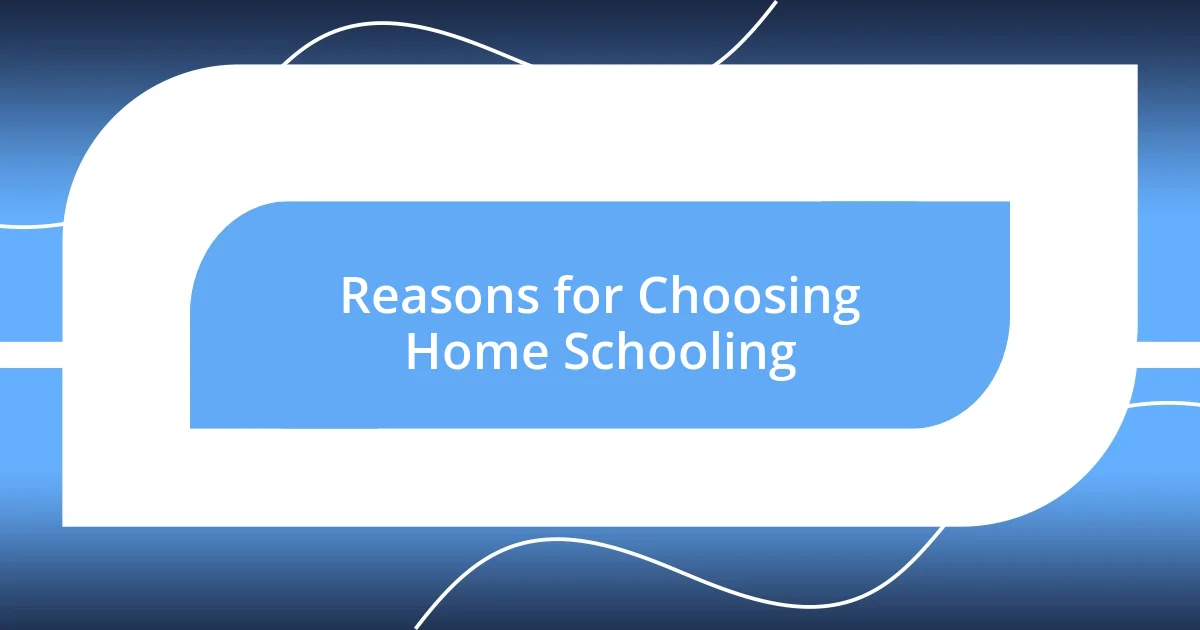
Reasons for Choosing Home Schooling
The reasons for choosing home schooling are as diverse as the families who adopt this educational approach. From my observations, many parents gravitate towards home schooling to foster a tailored learning experience. For instance, I recall visiting a home school co-op where families emphasized a love for nature. They incorporated outdoor explorations into their curriculum, teaching science through firsthand experiences like hiking and studying ecosystems. The parents I spoke with expressed how this hands-on approach not only educated their children but also built lasting family bonds and enriched their children’s appreciation for the environment.
Here are some common reasons parents choose home schooling:
- Customized Curriculum: Parents can create personalized learning paths based on their child’s interests and strengths.
- Flexible Schedule: Families enjoy the freedom to learn at their own pace, allowing for more travel opportunities or breaks.
- Stronger Family Bonds: Home schooling often leads to more quality time together, nurturing deeper connections.
- Focus on Values: Parents can integrate their personal beliefs and values into their children’s education.
- Learning Environment: Many find that a home environment reduces distractions and allows for more focused learning.
In speaking with home schooling parents, I’ve often sensed a passionate commitment to crafting an educational journey that caters to their family’s unique perspective. The joy in these discussions often highlights a clear message: home schooling is not merely an alternative to traditional schooling; it’s a choice driven by a desire for meaningful engagement and tailored education.
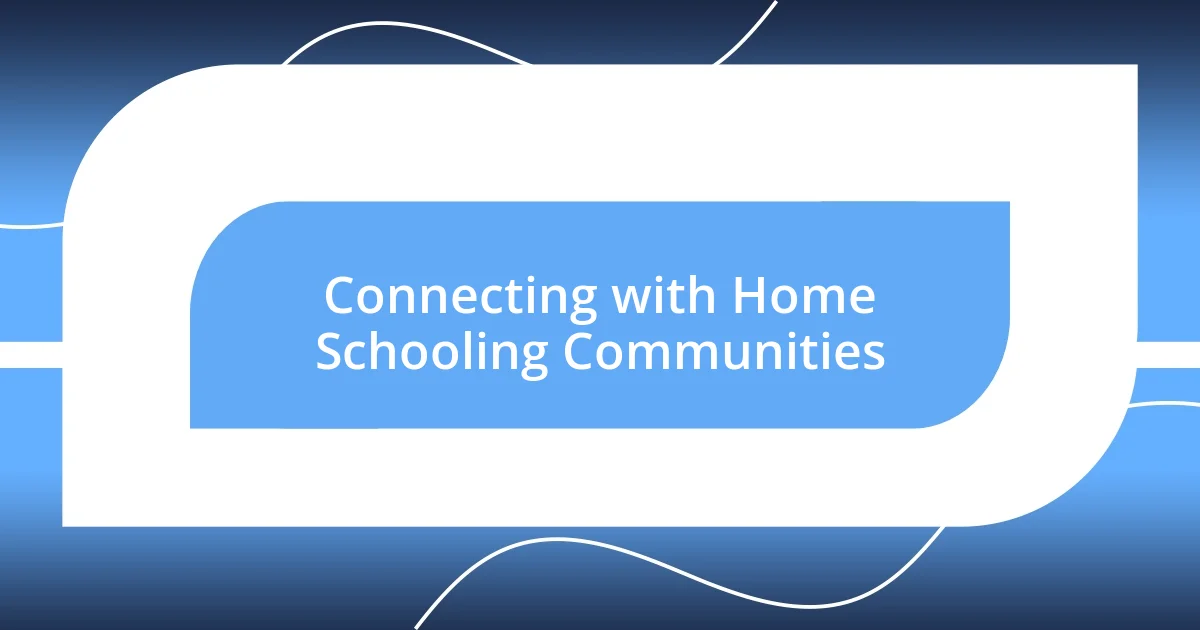
Connecting with Home Schooling Communities
Connecting with home schooling communities offers a wealth of opportunities for parents seeking support and shared experiences. When I first ventured into home schooling, I found that local co-ops were invaluable. Joining a group of like-minded families not only provided a sense of belonging but also gifted us with valuable resources and collaborative learning experiences. Have you ever attended a group field trip? Watching children explore and learn together was one of those magical moments that reinforced why we chose this path.
Social media has also changed the landscape of connecting with other home schoolers. I remember being hesitant to dive into online forums, thinking they might be overwhelming. In reality, they turned out to be treasure troves of advice, inspiration, and community. Engaging in discussions with parents from all over the country opened my eyes to various teaching methods and materials. It’s rewarding to share successes and challenges, creating a network that feels genuinely supportive and reassuring. Isn’t it interesting how a simple post can spark a rich conversation, leading to new ideas or perspectives?
Lastly, organizing local meetups can drastically enhance both the educational and social aspects of home schooling. There was a time when I hosted a small gathering at my home, inviting families to share their favorite subjects and resources. The connection created that day was remarkable—we not only swapped curriculum secrets but also forged friendships that extended beyond education. Watching the kids learn from one another brought a sense of joy that confirmed the beauty of community in this journey.
| Community Connection | Description |
|---|---|
| Local Co-ops | Groups where families collaborate on lessons and host social events. |
| Online Forums | Virtual platforms for sharing resources, advice, and experiences. |
| Meetups | In-person gatherings to exchange ideas and build friendships. |
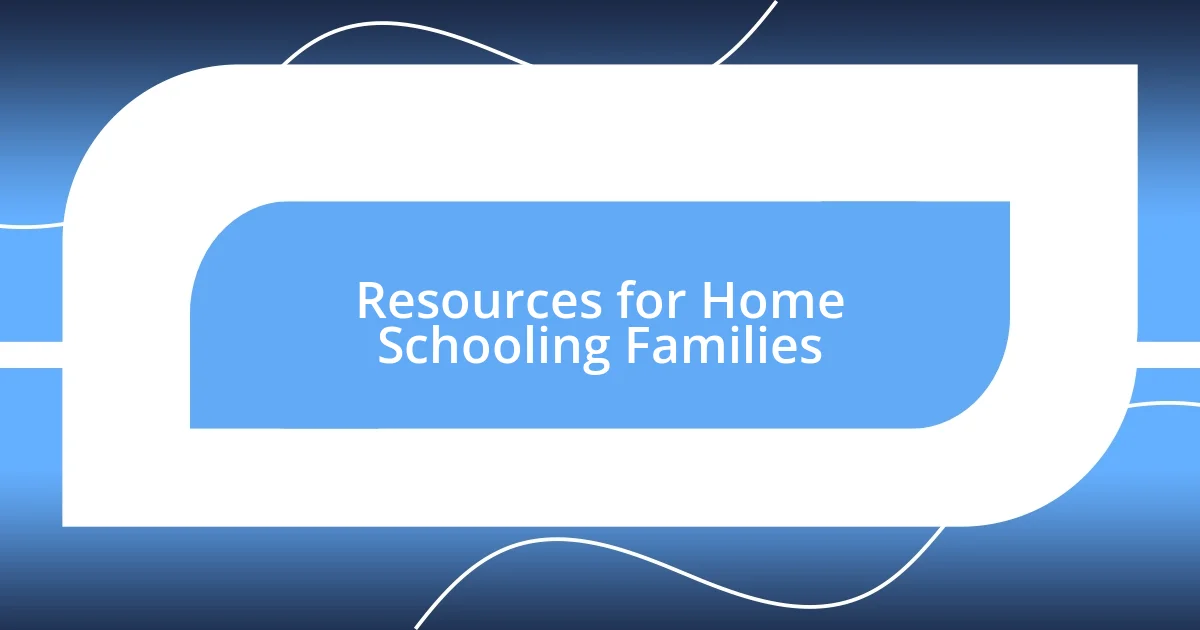
Resources for Home Schooling Families
Navigating resources for home schooling families can feel overwhelming at first, but I remember discovering some standout tools that truly made a difference. One particular resource that resonated with me was a subscription box service tailored for home schoolers. Each month, my children and I eagerly awaited our delivery, excited to dive into hands-on projects that aligned with our curriculum. Have you ever experienced that delightful anticipation of a new learning adventure? For us, it transformed lessons that might have felt monotonous into explorations we could all engage in together.
When it comes to online resources, I’ve found that educational websites which offer free lesson plans and interactive activities are absolute goldmines. One afternoon, while searching for science projects, I stumbled upon a site that provided not only thorough guides but also engaging videos that captivated my kids’ attention. The joy on their faces as they conducted simple experiments at home reminded me of the endless possibilities available when you blend technology with creativity. Isn’t it amazing how a well-designed website can spark curiosity and lead to meaningful learning moments?
Then there are local libraries—don’t underestimate their power as a resource hub! I vividly recall a summer program at our library where children could participate in reading challenges and science workshops. Those events weren’t just educational; they were a chance for my kids to meet peers and develop a sense of community. Have you checked out your local library lately? I encourage you to explore their offerings—it could be the treasure trove your family has been looking for, full of books, classes, and connections that enrich your home schooling experience.
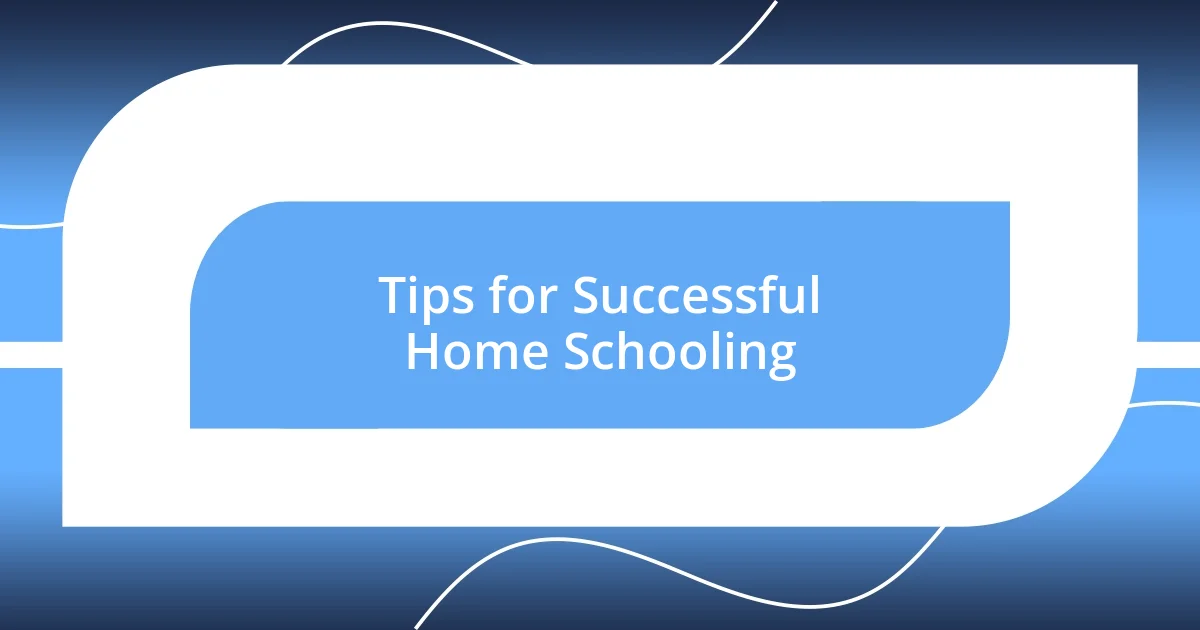
Tips for Successful Home Schooling
Creating a successful home schooling environment requires structure, and establishing a routine can significantly enhance learning. I remember the first few weeks we tried to fit in lessons without a solid schedule—it was chaos! Once we anchored our days around consistent times for subjects, things became smoother. It’s interesting how predictable elements can create a sense of security and focus for both children and parents. Have you found a routine that works for you?
Incorporating various learning styles keeps things dynamic and engaging. I once discovered that my youngest son thrived with hands-on activities, so I started integrating crafts and experiments into our lessons. This change made a marked difference in his enthusiasm—seeing him light up when something clicked was truly rewarding. Using a mix of visual, auditory, and kinesthetic approaches not only meets different needs but also transforms learning into a fun and memorable experience. Isn’t it captivating to see how each child’s unique preferences can unlock their potential?
Finally, regular reflection and adjustment are vital in the home schooling journey. After a few months, I set aside time each week to review what worked and what didn’t. It was eye-opening! I realized some subjects needed different strategies, while others required more in-depth exploration. This reflective practice not only improved our learning outcomes but also reinforced a growth mindset for my kids. Have you tried reflecting on your teaching methods? Trust me, it can lead to valuable insights that elevate your home schooling experience.
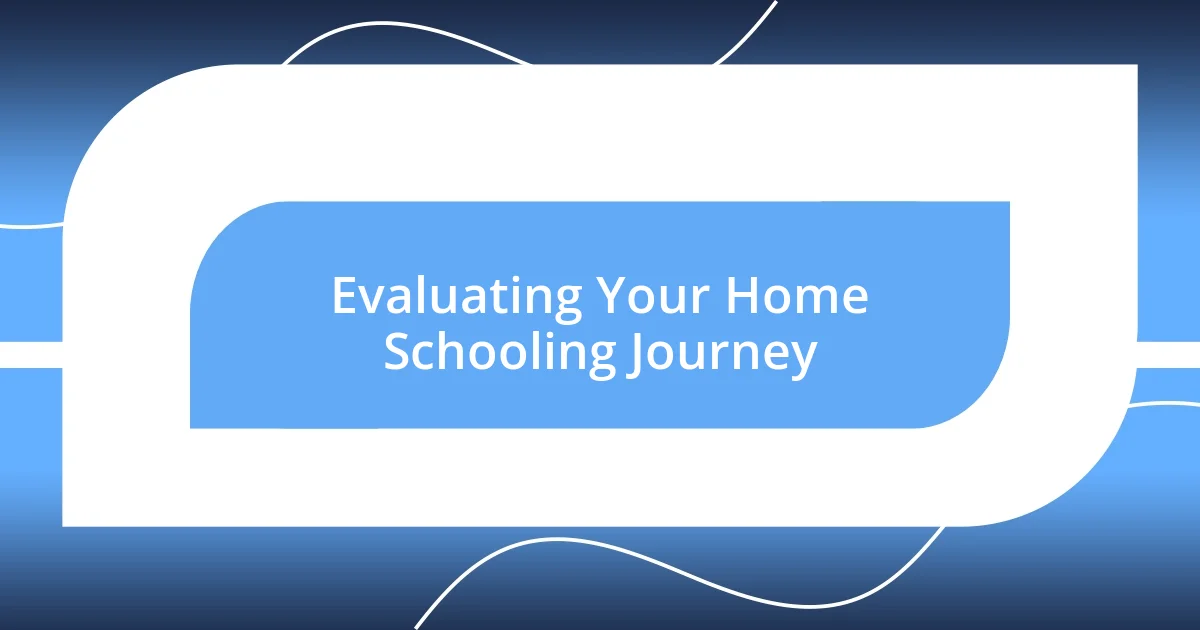
Evaluating Your Home Schooling Journey
Evaluating your home schooling journey is an essential step that can lead to significant growth. I remember one evening, staring at a pile of unfinished projects and textbooks, feeling overwhelmed. It struck me then that taking a step back to assess what was working—and what wasn’t—was crucial. Have you ever felt that moment of clarity? Sometimes, a simple evaluation can open the door to new strategies that breathe fresh life into the learning process.
As I delved deeper into our home schooling evaluation, I found myself asking whether our goals aligned with our methods. I distinctly recall a Sunday when I gathered my kids for an honest chat about their experiences. Their candid feedback was both enlightening and heartwarming; it highlighted their interests and concerns. This conversation not only informed our approach but also strengthened our bond. Isn’t it rewarding when your children feel heard and valued in their educational journey?
Another key aspect of this reflective practice is adapting to changing circumstances. I used to resist altering our plan, thinking consistency was key. However, I soon learned that flexibility can yield remarkable results. Once, during a particularly tumultuous week, I opted for a light review week instead of our packed schedule. It turned out to be a pivotal moment! My kids engaged more deeply with the material, and it improved their overall morale. Have you allowed yourself the grace and space to adapt your plans? Trust me, acknowledging the need for change can lead to unexpected joys in the home schooling journey.




